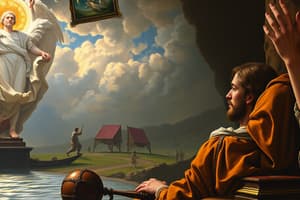Podcast
Questions and Answers
God delivered Israel from Egypt but had to destroy some unbelievers afterward.
God delivered Israel from Egypt but had to destroy some unbelievers afterward.
True (A)
The angels mentioned in Jude were judged for their loyalty to God.
The angels mentioned in Jude were judged for their loyalty to God.
False (B)
Sodom and Gomorrah were destroyed due to their sins, which are similar to those of the fallen angels.
Sodom and Gomorrah were destroyed due to their sins, which are similar to those of the fallen angels.
True (A)
Michael the archangel rebuked Satan directly over the body of Moses.
Michael the archangel rebuked Satan directly over the body of Moses.
Balaam was known for leading others into sin for personal gain.
Balaam was known for leading others into sin for personal gain.
The way of Cain represents acceptance of divine revelation and sacrifice.
The way of Cain represents acceptance of divine revelation and sacrifice.
Korah and his followers accepted the authority of Moses.
Korah and his followers accepted the authority of Moses.
False teachers promote themselves and respect the authority of God's servants.
False teachers promote themselves and respect the authority of God's servants.
The angels mentioned in Jude were imprisoned in Tartarus.
The angels mentioned in Jude were imprisoned in Tartarus.
Jude illustrates the judgment of Sodom and Gomorrah as an example of the consequences of sin.
Jude illustrates the judgment of Sodom and Gomorrah as an example of the consequences of sin.
Flashcards
Salvation and Membership
Salvation and Membership
The concept that merely being a member of a religious group (like the Jewish nation) does not guarantee salvation. People can be 'in the church' but still not be saved due to their sin.
Fallen Angels and Tartarus
Fallen Angels and Tartarus
The belief that angels who disobeyed God were punished and imprisoned in Tartarus, a special place of hell.
Judgment on Sodom and Gomorrah
Judgment on Sodom and Gomorrah
The idea that the judgment on Sodom and Gomorrah was a warning about the consequences of sin, similar to the angels who disobeyed and were imprisoned.
Michael's Authority
Michael's Authority
Signup and view all the flashcards
Cain's Way
Cain's Way
Signup and view all the flashcards
Balaam's Error
Balaam's Error
Signup and view all the flashcards
Korah's Rebellion
Korah's Rebellion
Signup and view all the flashcards
False Teachers and Their Characteristics
False Teachers and Their Characteristics
Signup and view all the flashcards
Identifying True and False Teachers
Identifying True and False Teachers
Signup and view all the flashcards
Jude's Warning
Jude's Warning
Signup and view all the flashcards
Study Notes
Israel's Destruction
- God delivered Israel from Egypt, yet destroyed unbelievers afterward.
- Simply being "in the church" doesn't guarantee salvation; many Jews were part of the nation but still suffered destruction due to sin.
Fallen Angels
- Jude references angels who joined with human women, per Genesis 6.
- These actions were part of Satan's plot to undermine the human race and prevent the promised Seed's birth (Genesis 3:15).
- The rebellious angels were judged and imprisoned in Tartarus, a specific area of hell, as described in 2 Peter 2:4.
Sodom and Gomorrah
- Jude draws a parallel between the sins of Sodom and Gomorrah and the angelic fornication.
- These sins, addressed in 2 Peter 2:6-8, illustrate the nature of divine judgment.
- The destruction of the cities serves as a cautionary tale, highlighting the consequences of wickedness.
Michael and Moses
- Michael, the archangel, is the protector of Israel (Daniel 12:1).
- Jude links Michael to the burial of Moses, potentially highlighting God's intervention.
- Moses will be a witness during the Tribulation (Revelation 11), but Satan initially tried to prevent this.
- Jude emphasizes that Michael didn't directly rebuke Satan; God did. False teachers, like the ones Jude addresses, are ignorant of this and challenge authority.
Cain
- Jude uses Cain's actions (Genesis 4) to illustrate the rejection of God's revealed truth and the need for blood sacrifice.
- Cain's example highlights man-made religion that opposes God's revelations and the sacrifice of Jesus. (See Heb. 11:4 and 1 John 3:11-12).
Balaam
- Jude highlights Balaam's deceitfulness (2 Peter 2:15-16).
- Balaam knowingly led Israel into sin for personal gain (Numbers 22-25, particularly 25:1-9).
Korah
- Korah and his followers challenged Moses' authority (Numbers 16).
- Jude uses Korah as an example of false teachers usurping God's ordained leaders.
False Teachers
- Jude vividly describes the false teachers, using metaphorical language ("clouds without water," "trees without fruit," and "wandering stars").
- These teachers lack depth and ultimately lead to harm.
- Their ultimate destruction is prophesied by Enoch.
- The consistent theme in the text involves condemning these false teachers as "ungodly."
Studying That Suits You
Use AI to generate personalized quizzes and flashcards to suit your learning preferences.




